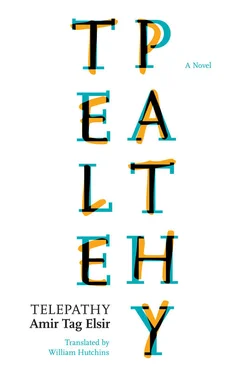I began to wish the tragedy would stop battering the Diligent Reader and allow her at least to pant, to change the pitch of her voice while it sought to create, to allow her half-closed eyes to relish books and her limp hands to grasp a mobile phone and dial a number.
Nishan Hamza no longer interested me: whether he lived or died or wrote a hundred novels comparable to Hunger’s Hopes and transmitted them via his tedious, silly telepathy. The ending I had endeavored to learn no longer interested me nearly as much as the end, which I didn’t want to learn about, of someone like Linda, whom I had out of excessive egoism wanted for my wife. . when all she aspired to was to continue living.
I was terribly alarmed whenever my phone rang, expecting it would be the stern, arrogant Shadow with the larvae of tears buried alive in his eyes, calling to inform me of his daughter’s passing. I would check the number and feel relief that it wasn’t the Shadow’s or that of any of his acquaintances. At times I would answer the phone and at other times I would rebel against replying. During those futile days I attempted to diminish my isolation a little to keep myself from joining Nishan and becoming a resident in al-Nakhil Private Hospital.
I began to frequent coffeehouses I had previously patronized, with friends or readers who had a claim to my friendship because of all the times I had encountered them in my life. Occasionally I would talk excessively and laugh pointlessly. I knew for certain that I was expending all my feigned delight outside my house, because seclusion would scatter any harbingers of delight that tried to burst forth.
Many people spoke to me by phone. Najma rang me a number of times but I didn’t answer her. I went on her Facebook page during a moment of relaxation but was surprised to find that she had unfriended me. Even so I was able to read her page’s contents without being able to comment. There was a new picture of her, wearing a red track suit and Adidas shoes. She announced that she would be presenting a new lecture featuring Isa Warif as her guest. He was the cultured, world-class runner who had carried the Olympic torch on one of its stages. “He will discuss the organization of health and sports and grant us hope of living healthily and dying of anything except illness.” This time the lecture was being held in the Elegance Health Club in the center of the city. She was on its board of directors.
There were no new posts of her sentiments or atrocious stories, and I didn’t find any of the flash essays she customarily put on the page and that earned hundreds of “likes”.
The truth was that it didn’t matter to me whether she unfriended me or put my picture on her homepage. I don’t know why I had entered the page and why I followed the progress of a girl I had categorized as a disaster since we first met. Our meeting in the Juwana Café had reinforced that categorization. She ought to be part of a past that had departed, leaving behind no memories worth recalling.
The girl who manufactured a tragedy and danced to its funereal dirges, who had plotted maternity with a pen on paper, sans emotion, might obtain it and might not, but the only flame she would light in the mind of a novelist would be the silly fire pits he earnestly attempts to keep from igniting in his writing. Many people, as usual, had posted “likes”, and many had commented profusely on her fiery red outfit. No one had posted even a terse greeting for the world-class runner who had carried the Olympic torch.
What I term “fictitious deceit” occurs if faces and emotions are different when an author’s pen writes in a vast expanse as opposed to a back alley or street. I had known — and the miserable petition writer had too — that this entire online fictitious following meant no more to Najma than a pesky gnat she could easily annihilate whenever she wanted.
I still felt languid, even after reading Najma’s page, and with the same languor clicked on my own page, where I posted a poem about death in a number of couplets and attributed it to a fictitious Mexican poet. I called the poem “The Imminent Death of a Reader” and identified the poet as Sebastian Ablino. I didn’t wait to see if anyone would “like” it or post a comment and proceeded to the page of “The Virtuous Sister” Nariman, merely to distract myself, nothing more.
Her page was flaming that day, perhaps more than ever before. New names had joined forces to heat it up: Shaved Mustache, Mullah Umar, The Only Man who Loves Veiled Women, A Refugee to Your Eyes, and a woman who called herself “Help!” On every post on the page she wrote: “Help! Help me!”
There was a romantic poem from The Yearning Sheikh, who said it was one of his choicest poems and that he was publishing it for the first time in response to popular demand, even though no one had actually wept or implored him to publish this poem. In short, he was posting it merely because he wanted to.
Poetry boils in my sad heart,
Inscribing poems on the brow,
And beneath the face veil are the ashes of a face,
But the splendor of the buried secret,
Even if the feelings are veiled,
I will certainly read.
When Nariman appears, we are joyous.
When she vanishes, you find we feel lost.
Her presence seems a call to love
And to dreams that appear clear but are not explicit.
Were it not for my beard and white hair,
I would repeat my poems endlessly.
No one had marked this poem with a “like” except The Yearning Sheikh himself. It was followed by what I imagined was a tepid “like” that had slipped from the sarcastic fingers of The Virtuous Sister. Someone named Student of Religious Science had accused the Sheikh of succumbing to temptation and of always being on a suspect page. The Sheikh had responded that Romantic poetry had never been forbidden, provided it was chaste and designed only to display one’s talent. Addressing this Student of Religious Science, he asked, “If this is a seductive page, why are you on it?”
I tried to smile but couldn’t. I directed my imagination for a number of minutes toward that putative Nariman. I imagined her once as a girl who had a desiccated heart and dangled excessive seduction in the path of innocent individuals whom she carefully chose. Then I changed my mind and imagined Nariman as a wastrel boy composing, for eventual release, a scandalous book in which these evedentiary, incriminating trifles would be featured.
I finally quit the site when my languor disappeared, and the torn picture of Linda the Shadow jumped piece by piece before me.
I had made a huge error when I gave my cell phone number to Shu‘ayb Zuhri, the young man from Wadi al-Hikma who wrote the story that was totally unrelated to Cervantes. My phone was busy most of the day with Zuhri’s damn messages, which contained flash stories that I was supposed to read and comment on. I didn’t have the strength even to peruse a traffic sign while I was driving, but the writer’s insistence finally moved me to cast a few quick glances at his stories. I discovered a story called “Whisper”, which read: “I whispered to the cloud, and the cloud heard my whisper.” Another story, which was named “The Outcast” read: “I found our neighbors’ dog in a district dozens of kilometers from ours. I asked her, ‘Why are you here, bitch?’ She replied, ‘It’s not because one of your neighbors cast me out of their house, even though they don’t have food for breakfast, lunch, or supper.’”
I started to reply to this inanity with a comment even more inane but refrained at the last moment. It wouldn’t hurt me to deceive a fantasist and let time teach him wisdom, just as it had taught me. Perhaps he would grow up one day. I wrote him: “Astonishing, Zuhri. You’re on the right track.”
Читать дальше












